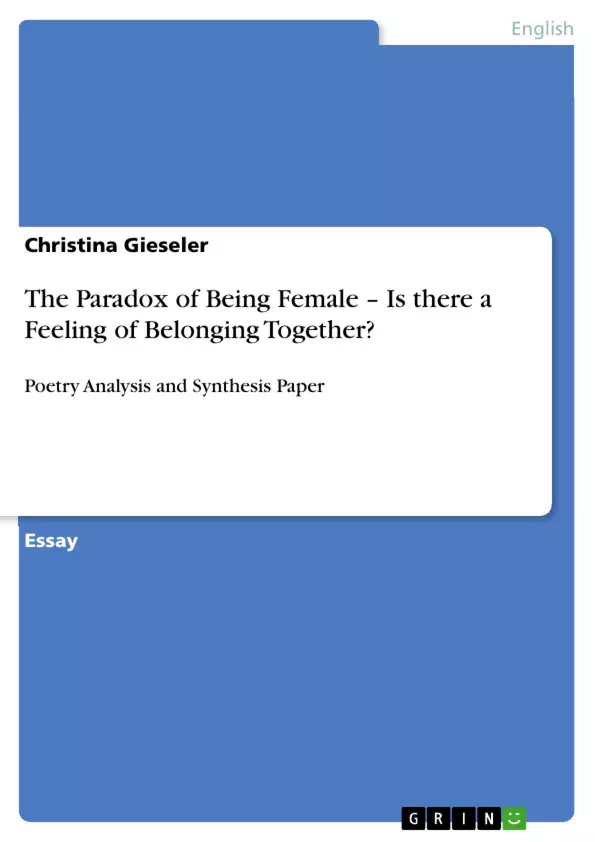Being female constitutes a kind of paradox. On the one hand, women constitute one group, one category because of their sex. On the other hand, the belonging to this group does not always
mean that women have anything more in common than their sex. Genny Lim’s poem “Wonder Woman” shows how the category of being female is divided in itself by other master statuses that
not all women share, and it reveals that one’s sex is not an issue which make humans necessarily stick together. On the basis of Rosenblum’s and Travis’ work The Meaning of Difference:
American Constructions of Race, Sex and Gender, Social Class and Sexual Orientation, this paper will focus on the way in which Genny Lim’s poem illustrates the construction of the
“category of women”, and how concepts such as “Dichotomization”, “Othering”, “Aggregation”and “Double Consciousness” come into play when the poem’s lyrical speaker ponders about and
also criticizes the differences and similarities that she finds in women.
Table of Contents
- The Paradox of Being Female – Is there a Feeling of Belonging Together?
Objectives and Key Themes
This paper analyzes Genny Lim's poem "Wonder Woman" through the lens of Rosenblum and Travis's work, "The Meaning of Difference," examining how the poem constructs the "category of women" and explores concepts like dichotomization, othering, aggregation, and double consciousness. The poem's lyrical speaker grapples with the similarities and differences among women, considering their various master statuses (sex, gender, sexual orientation, social class, race, and cultural background).
- The construction of the "category of women" and its internal divisions.
- The role of dichotomization and othering in shaping relationships between women.
- The concept of aggregation and the poem's exploration of women's collective identity.
- The experience of double consciousness and its implications for female identity.
- The limitations of social class and gender roles on women’s lives.
Chapter Summaries
The Paradox of Being Female – Is there a Feeling of Belonging Together?: This paper examines Genny Lim's poem "Wonder Woman," focusing on how the poem portrays the complexities of female identity and the challenges women face in forging connections with one another. The poem's speaker observes diverse women from various backgrounds and social classes, noting the significant differences that often overshadow their shared sex. Key concepts from Rosenblum and Travis's "The Meaning of Difference," such as dichotomization (the division of women into opposing groups based on other social statuses), othering (the perception of other women as different and separate), and aggregation (the potential for women to unite as a collective group), are central to understanding the poem's exploration of female solidarity and its limitations. The analysis delves into how factors like social class, sexual orientation, and race create divisions among women, hindering their ability to form a unified group. The poem utilizes parallelisms and contrasts to highlight these divisions, while also exploring the potentially self-imposed limitations through the creation of internal walls and boundaries. The speaker's journey of self-reflection, concluding with a sense of double consciousness, suggests a potential for recognizing shared experiences and dreams among women despite these barriers, yet without indicating a direct resolution to the core conflicts presented.
Keywords
Genny Lim, Wonder Woman, female identity, dichotomization, othering, aggregation, double consciousness, social class, sexual orientation, race, gender, belonging, master statuses, Rosenblum & Travis, The Meaning of Difference.
Frequently Asked Questions: Analysis of Genny Lim's "Wonder Woman"
What is the main focus of this analysis?
This analysis examines Genny Lim's poem "Wonder Woman" to understand how it portrays the complexities of female identity and the challenges women face in forming connections with each other. It uses the theoretical framework of Rosenblum and Travis's "The Meaning of Difference" to explore concepts like dichotomization, othering, aggregation, and double consciousness within the context of the poem.
What are the key themes explored in the poem and the analysis?
Key themes include the construction of the "category of women" and its internal divisions; the role of dichotomization and othering in shaping relationships between women; the concept of aggregation and the poem's exploration of women's collective identity; the experience of double consciousness and its implications for female identity; and the impact of social class and gender roles on women's lives.
How does the analysis utilize Rosenblum and Travis's "The Meaning of Difference"?
The analysis uses concepts from "The Meaning of Difference" – specifically dichotomization (dividing women into opposing groups), othering (perceiving other women as different), and aggregation (the potential for women to unite) – to interpret how the poem portrays the complexities of female relationships and the challenges to forming a unified female identity.
What are the key findings of the chapter summarizing the poem's analysis?
The analysis finds that the poem highlights significant differences among women based on factors like social class, sexual orientation, and race, often overshadowing their shared sex. These differences create divisions and hinder the formation of a unified group. While the poem explores the potential for collective identity (aggregation), the speaker's experience of double consciousness suggests a complex and unresolved struggle for belonging and shared identity.
What are the limitations of the analysis?
The provided summary does not offer specific limitations of the analysis itself. The analysis focuses on exploring the poem's themes and does not explicitly state methodological limitations or areas for further research. The summary concludes with a sense of unresolved conflict, suggesting that the poem itself doesn't offer simple solutions to the complexities it presents.
What are the key words associated with this analysis?
Key words include: Genny Lim, Wonder Woman, female identity, dichotomization, othering, aggregation, double consciousness, social class, sexual orientation, race, gender, belonging, master statuses, Rosenblum & Travis, The Meaning of Difference.
- Citation du texte
- Christina Gieseler (Auteur), 2007, The Paradox of Being Female – Is there a Feeling of Belonging Together?, Munich, GRIN Verlag, https://www.grin.com/document/148726



